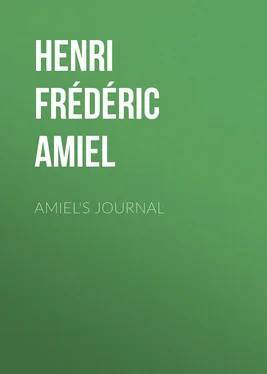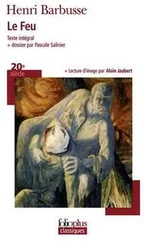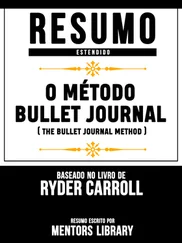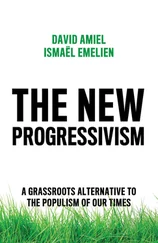Henri Frédéric Amiel - Amiel's Journal
Здесь есть возможность читать онлайн «Henri Frédéric Amiel - Amiel's Journal» — ознакомительный отрывок электронной книги совершенно бесплатно, а после прочтения отрывка купить полную версию. В некоторых случаях можно слушать аудио, скачать через торрент в формате fb2 и присутствует краткое содержание. Издательство: Иностранный паблик, Жанр: literature_19, foreign_antique, foreign_prose, Зарубежные любовные романы, на английском языке. Описание произведения, (предисловие) а так же отзывы посетителей доступны на портале библиотеки ЛибКат.
- Название:Amiel's Journal
- Автор:
- Издательство:Иностранный паблик
- Жанр:
- Год:неизвестен
- ISBN:нет данных
- Рейтинг книги:5 / 5. Голосов: 1
-
Избранное:Добавить в избранное
- Отзывы:
-
Ваша оценка:
- 100
- 1
- 2
- 3
- 4
- 5
Amiel's Journal: краткое содержание, описание и аннотация
Предлагаем к чтению аннотацию, описание, краткое содержание или предисловие (зависит от того, что написал сам автор книги «Amiel's Journal»). Если вы не нашли необходимую информацию о книге — напишите в комментариях, мы постараемся отыскать её.
Amiel's Journal — читать онлайн ознакомительный отрывок
Ниже представлен текст книги, разбитый по страницам. Система сохранения места последней прочитанной страницы, позволяет с удобством читать онлайн бесплатно книгу «Amiel's Journal», без необходимости каждый раз заново искать на чём Вы остановились. Поставьте закладку, и сможете в любой момент перейти на страницу, на которой закончили чтение.
Интервал:
Закладка:
So that as a professor he made no mark. He was conscientiousness itself in whatever he conceived to be his duty. But with all the critical and philosophical power which, as we know from the Journal, he might have lavished on his teaching, had the conditions been other than they were, the study of literature, and the study of philosophy as such, owe him nothing. But for the Journal his years of training and his years of teaching would have left equally little record behind them. “His pupils at Geneva,” writes one who was himself among the number, [Footnote: M. Alphonse Rivier, now Professor of International Law at the University of Brussels.] “never learned to appreciate him at his true worth. We did justice no doubt to a knowledge as varied as it was wide, to his vast stores of reading, to that cosmopolitanism of the best kind which he had brought back with him from his travels; we liked him for his indulgence, his kindly wit. But I look back without any sense of pleasure to his lectures.”
Many a student, however, has shrunk from the burden and risks of family life, and has found himself incapable of teaching effectively what he knows, and has yet redeemed all other incapacities in the field of literary production. And here indeed we come to the strangest feature in Amiel’s career—his literary sterility. That he possessed literary power of the highest order is abundantly proved by the “Journal Intime.” Knowledge, insight, eloquence, critical power—all were his. And the impulse to produce, which is the natural, though by no means the invariable, accompaniment of the literary gift, must have been fairly strong in him also. For the “Journal Intime” runs to 17,000 folio pages of MS., and his half dozen volumes of poems, though the actual quantity is not large, represent an amount of labor which would have more than carried him through some serious piece of critical or philosophical work, and so enabled him to content the just expectations of his world. He began to write early, as is proved by the fact that at twenty he was a contributor to the best literary periodical which Geneva possessed. He was a charming correspondent, and in spite of his passion for abstract thought, his intellectual interest, at any rate, in all the activities of the day—politics, religious organizations, literature, art—was of the keenest kind. And yet at the time of his death all that this fine critic and profound thinker had given to the world, after a life entirely spent in the pursuit of letters, was, in the first place, a few volumes of poems which had had no effect except on a small number of sympathetic friends; a few pages of pensées intermingled with the poems, and, as we now know, extracted from the Journal; and four or five scattered essays, the length of magazine articles, on Mme. de Staël, Rousseau, the history of the Academy of Geneva, the literature of French-speaking Switzerland, and so on! And more than this, the production, such as it was, had been a production born of effort and difficulty; and the labor squandered on poetical forms, on metrical experiments and intricate problems of translation, as well as the occasional affectations of the prose style, might well have convinced the critical bystander that the mind of which these things were the offspring could have no real importance, no profitable message, for the world.
The whole “Journal Intime” is in some sense Amiel’s explanation of these facts. In it he has made full and bitter confession of his weakness, his failure; he has endeavored, with an acuteness of analysis no other hand can rival, to make the reasons of his failure and isolation clear both to himself and others. “To love, to dream, to feel, to learn, to understand—all these are possible to me if only I may be dispensed from willing—I have a sort of primitive horror of ambition, of struggle, of hatred, of all which dissipates the soul and makes it dependent on external things and aims. The joy of becoming once more conscious of myself, of listening to the passage of time and the flow of the universal life, is sometimes enough to make me forget every desire and to quench in me both the wish to produce and the power to execute.” It is the result of what he himself calls “l’éblouissement de l’infini .” He no sooner makes a step toward production, toward action and the realization of himself, than a vague sense of peril overtakes him. The inner life, with its boundless horizons and its indescribable exaltations, seems endangered. Is he not about to place between himself and the forms of speculative truth some barrier of sense and matter—to give up the real for the apparent, the substance for the shadow? One is reminded of Clough’s cry under a somewhat similar experience:
“If this pure solace should desert my mind,
What were all else? I dare not risk the loss.
To the old paths, my soul!”
And in close combination with the speculative sense, with the tendency which carries a man toward the contemplative study of life and nature as a whole, is the critical sense—the tendency which, in the realm of action and concrete performance, carries him, as Amiel expresses it, “droit au défaut,” and makes him conscious at once of the weak point, the germ of failure in a project or an action. It is another aspect of the same idiosyncrasy. “The point I have reached seems to be explained by a too restless search for perfection, by the abuse of the critical faculty, and by an unreasonable distrust of first impulses, first thoughts, first words. Confidence and spontaneity of life are drifting out of my reach, and this is why I can no longer act.” For abuse of the critical faculty brings with it its natural consequences—timidity of soul, paralysis of the will, complete self-distrust. “To know is enough for me; expression seems to me often a profanity. What I lack is character, will, individuality.” “By what mystery,” he writes to M. Scherer, “do others expect much from me? whereas I feel myself to be incapable of anything serious or important.” Défiance and impuissance are the words constantly on his lips. “My friends see what I might have been; I see what I am.”
And yet the literary instinct remains, and must in some way be satisfied. And so he takes refuge in what he himself calls scales, exercises, tours de force in verse-translation of the most laborious and difficult kind, in ingenious vers d’occasion , in metrical experiments and other literary trifling, as his friends think it, of the same sort. “I am afraid of greatness. I am not afraid of ingenuity; all my published literary essays are little else than studies, games, exercises, for the purpose of testing myself. I play scales, as it were; I run up and down my instrument. I train my hand and make sure of its capacity and skill. But the work itself remains unachieved. I am always preparing and never accomplishing, and my energy is swallowed up in a kind of barren curiosity.”
Not that he surrenders himself to the nature which is stronger than he all at once. His sense of duty rebels, his conscience suffers, and he makes resolution after resolution to shake himself free from the mental tradition which had taken such hold upon him—to write, to produce, to satisfy his friends. In 1861, a year after M. Scherer had left Geneva, Amiel wrote to him, describing his difficulties and his discouragements, and asking, as one may ask an old friend of one’s youth, for help and counsel. M. Scherer, much touched by the appeal, answered it plainly and frankly—described the feeling of those who knew him as they watched his life slipping away unmarked by any of the achievements of which his youth had given promise, and pointed out various literary openings in which, if he were to put out his powers, he could not but succeed. To begin with, he urged him to join the Revue Germanique, then being started by Charles Dollfus, Renan, Littré, and others. Amiel left the letter for three months unanswered and then wrote a reply which M. Scherer probably received with a sigh of impatience. For, rightly interpreted, it meant that old habits were too strong, and that the momentary impulse had died away. When, a little later, “Les Etrangères,” a collection of verse-translations, came out, it was dedicated to M. Scherer, who did not, however, pretend to give it any very cordial reception. Amiel took his friend’s coolness in very good part, calling him his “dear Rhadamanthus.” “How little I knew!” cries M. Scherer. “What I regret is to have discovered too late by means of the Journal, the key to a problem which seemed to me hardly serious, and which I now feel to have been tragic. A kind of remorse seizes me that I was not able to understand my friend better, and to soothe his suffering by a sympathy which would have been a mixture of pity and admiration.”
Читать дальшеИнтервал:
Закладка:
Похожие книги на «Amiel's Journal»
Представляем Вашему вниманию похожие книги на «Amiel's Journal» списком для выбора. Мы отобрали схожую по названию и смыслу литературу в надежде предоставить читателям больше вариантов отыскать новые, интересные, ещё непрочитанные произведения.
Обсуждение, отзывы о книге «Amiel's Journal» и просто собственные мнения читателей. Оставьте ваши комментарии, напишите, что Вы думаете о произведении, его смысле или главных героях. Укажите что конкретно понравилось, а что нет, и почему Вы так считаете.












